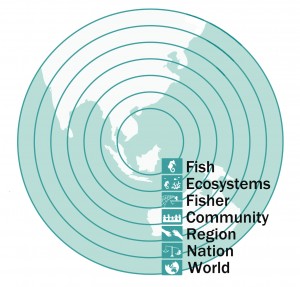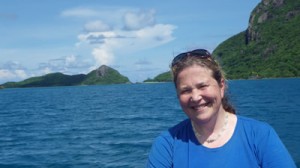BIOL420 is an interdisciplinary conservation course that takes a solutions-oriented approach to marine issues, drawing from natural sciences, social sciences, business, law, and communication. (Prerequisite: Fourth year standing)
Course Description
This course is about securing a healthy future for the ocean. It is unusual in integrating biophysical sciences, social sciences, policy (that reconciles the two) and communication. The ocean is immensely rich in wildlife and in resources, but it is also subject to tremendous human pressures of extraction and use. In this course we will explore how to address ocean issues wisely and well. Our starting point is with marine species of conservation concern. We then move out through ever-broader topics including ecosystem resilience, management of fisheries (and other pressures), community development, national regulations, international trade and global governance.
 A schematic representation of the “onion world”, in which layers of pressure bear down on the marine life that is so critically important in terms of biodiversity and food security. In this course, we will work our way out across the layers of the onion, looking at ways to relieve pressure wherever we can. The interdisciplinary approach represented in this scheme calls for a constructive mindset.
A schematic representation of the “onion world”, in which layers of pressure bear down on the marine life that is so critically important in terms of biodiversity and food security. In this course, we will work our way out across the layers of the onion, looking at ways to relieve pressure wherever we can. The interdisciplinary approach represented in this scheme calls for a constructive mindset.
Why is this course important?
This course is one way to help build a vital capacity and constituency to ensure the survival of marine life, for conservation and for consumption. As marine conservation and food security problems loom ever larger, we must address the reality that too few people act in support of the ocean. This is desperately worrying, given that (i) the ocean embraces 99% of places where life is possible on our planet, (ii) a vast array of human needs are met by a healthy ocean, and (iii) marine management is so bad that we have removed about 90% of the fish in many predatory species. While the single greatest threat to marine life is poor fishing practices, we will also consider other problems such as habitat degradation (physical damage and pollution), invasive species, and climate change. Our job will be to take this gloomy starting point and explore options for making a difference.
Intended Audience
Students from diverse backgrounds interested in effecting change in our global situation.
The intellectual content will be broadly relevant to a range of interests in natural sciences, social sciences, law, and business. Students do not need to have a background in marine issues. We will be very solution-oriented, seeking ways to move beyond identifying the problems. This course will, therefore, be enriched by students who bring different perspectives. Students will be active in this course, contributing to decision-making and undertaking work that may be immediately deployed on the front lines of sustainability. You should leave the course feeling empowered to speak for the ocean, and also with greater confidence to engage with a wide array of other environmental issues.
Enrollment: Maximum of 25 students
Course-level learning outcomes
At the end of this course students will be able to:
1. Explain the challenges facing the ocean, and the people who manage it.
2. Integrate a diverse array of information to develop nuanced appreciation of issues in ocean sustainability.
3. Identify diverse perspectives on sustainability issues in ways that will improve the effectiveness of personal contributions to environmental concerns.
4. Turn critical concerns about conservation issues into constructive contributions to progress toward sustainability.
5. Recognize good management practices in ocean sustainability and challenge received wisdom for long-established but unreliable practices.
6. Propose, plan and take action for conservation and environmental issues.
7. Deploy new skills in communication (including policy briefings and grant writing) in preparation for professional careers.
COURSE CONTENT
Connected themes will be emphasized in an array of technical topics and practical skills. The following is a list of the main themes that will be covered and integrated, (one or two per week), starting with species to ecosystem, then on to human community and various layers of interaction between people and the ocean.
Themes:
- How to move beyond problem identification.
- How to have the confidence to take action.
- How to use interdisciplinarity in problem solving.
- How to reconcile values of species as wildlife and food.
- How to work at multiple geographic and political scales.
- How to achieve outputs, outcomes and impacts — and to tell the difference among them.
- The importance of collaboration, co-operation, and inclusiveness
Topics covered (these and more….)
- getting to know the ocean,
- threatened species tools,
- ecosystem-based management,
- fisheries regulation,
- other human pressures on the ocean,
- marine protected areas,
- community-based management,
- gender equity,
- subsidies and trade controls,
- reliable governance,
- international agreements,
- risk analysis,
- citizen science.
Technical skills
- oral presentations
- written reports
- policy briefings
- grant writing
- conventional and social media.
Instructors
Prof. Amanda Vincent is your primary instructor. She is a Professor at UBC’s Institutefor the Oceans and Fisheries (Faculty of Science) and the Director and Co-founder of Project Seahorse, an award-winning international marine conservation group.

Amanda Vincent has a PhD in marine biology from the University of Cambridge and was Darwin Senior Research Fellow at the University of Oxford from 1994 to 1996. She is considered the leading authority on seahorse biology and conservation, and in 2000 was named a Pew Fellow in Marine Conservation.
Dr. Vincent is very active in marine management and policy issues. She is Chair of the IUCN SSC Seahorse, Pipefish and Seadragon Group. She is the marine representative on the IUCN’s International Red List Committee and is the Chair of its Marine Conservation Committee. From 2000-2004, she chaired the Syngnathid Working Group for the 180-nation Convention on the International Trade in Endangered Species (CITES).
For more information on Prof. Vincent’s work see Project Seahorse‘s website.
Follow Dr Vincent on twitter @amandavincent1